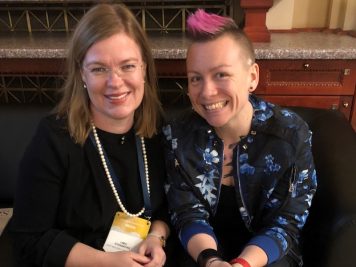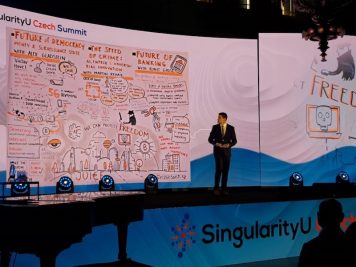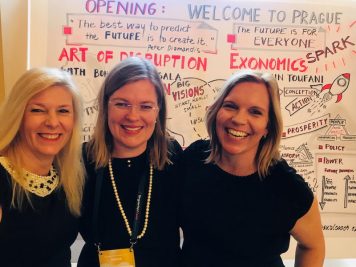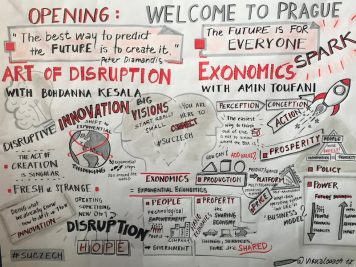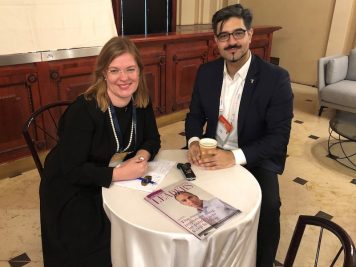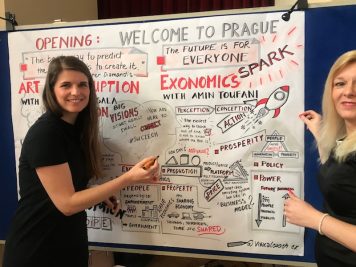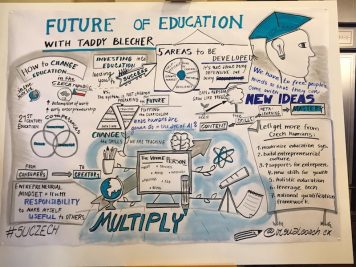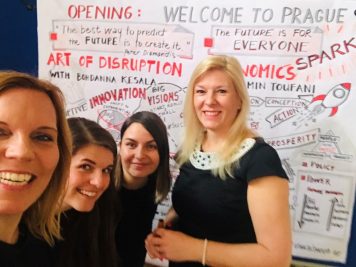Anita Schjøll Brede: The Future of AI
Visionaries and futurists met again in the Czech Republic, at the representative premises of Žofín Palace, in the beginning of April 2019. For the second time, leading-edge speakers from Singularity University joined Central European leaders and innovators for a visionary journey on learning, inspiration and sharing. SingularityU 2019 focused on young leaders, future generation and women. A live band and a special graphic recording made the event even more engaging for the audience, unique and unforgettable. Czech and Slovak Leaders Magazine had the opportunity to interview the two very distinguished speakers. Fasten your seatbelts and enjoy the journey to the future.
Anita Schjøll Brede: The Future of AI
Anita is the CEO and Co-Founder of Iris.ai; one of the 10 most innovative artificial intelligence startups in 2017 according to Fast Company. Iris.ai is an AI Science assistant, able to read, digest and connect scientific knowledge, that will grow up to be the world’s first AI Researcher within a decade. Designed to democratize access to science, Iris.ai can reduce R&D departments’ time to map out existing research by 95% and remove the current necessity of having deep domain expertise involved in the process, thus allowing more people to solve more difficult problems. Anita has never had what she refers to as “a real job” and Iris.ai is her fourth startup. The past 10 years of her career have spanned over 9 industries including developing an e-learning tool in Silicon Valley, performing theatre for babies, reducing energy consumption in the process industry through heat exchanger network optimization, getting 30 (mainly middle-age, male) engineers to dance to ABBA in front of their co-workers, facilitating solar light business creation in Kenya, being in the center of several startups crashing and burning, organizing entrepreneurial conferences and trying to disrupt the recruitment industry. She also dropped by 6 universities on the way. And built a race car.
Anita, speaking to you as a mother of a teenage daughter gifted in STEM, what is that our society fails to tackle to bring more girls to tech?
The basic answer goes to the way we treat our children from early childhood. We give the girls dolls and we give the boys fire-trucks. At school, when a boy gets a bad grade in math, he is encouraged to keep trying. If a girl gets a bad grade in the same subject, it is likely suggested that she concentrate on other subjects. Many studies on the way we socialize our children are now available. One of my favourite stories is from the US: one congresswoman had another congresswoman as a friend and enjoyed spending free time together. One day, one of their children asked, “mummy, can men be a congresswomen too?”. For this child, there were only congresswomen around, no congressmen. Therefore, I believe that role models are extremely important. The next important thing is to teach our children that they can. The problem is that many decisions are still made by people brought up in a system that was very different from the one that we hope to build now – a system where a 15-year-old girl can be whoever she wants to be. Systemic change needs to happen and at the same time it is happening very fast. According to the latest outcomes of the Draw a Scientist Test, more women scientists or female role models are now being drawn by children. Research proves that we are on the right track. We need to take further actions. Let us not forget that diversity has more angles than gender. We need visible women role-models on stage, people of color on stage as well as people with disabilities on stage, all talking about their experiences. We live in a world that is more and more inclusive.
Anita, I admire your work with Iris.ai concentrating on artificial intelligence in science. We know that science is also gender biased. Some AI systems actually discriminated against women in the past, such as the Amazon HR system, as it was based on algorithms and data coming from mostly men candidates. How will you make sure that this will not happen?
Our algorithms do not use the citation system that holds incredible amount of data, but is biased itself, biased towards researchers with the most citations, financially strong institutions, and yes, most researchers are white men of certain age. Currently we are reading the texts and comparing whether the text is relevant to the area of the research one is interested in. Hopefully one day we will have data proving the socialized differences. There are differences in the way men and women present their experiences. Even if you remove gender markers, the fact is that men present themselves differently and eventually AI might favor them. So far, we do not have data on whether women and men write research differently. I am looking forward to finding out one day. Is there a difference how male and female scientists write their abstracts and conclusions and how does that affect our algorithms? So far, I assume that compared to the citation system biases, the difference is small.
Your system is open. Is there enough of interest for evidence that might be conflicting one’s preliminary finding or have we become comfortable just to confirm the idea of our social bubble?
We are specifically targeting academics and researchers. We tend to see a generational gap, those who have been in the field for more than two decades are more likely to possess the “I know what I am doing attitude”. To a certain extent, this might be true, just imagine that there are 300 researchers and you have met them all over the course of your career. However, there are always tendential fields, as well as interdisciplinary research, that one might be not aware of. On the other hand, the person who knows it all and has been everywhere does not need our tool anyway. For anyone dealing with interdisciplinarity, the tool is useful, since you cannot absorb it all. We also see that our tool is very much appreciated by recent master’s students or PhDs, as they do not have the overall view, but have the open mindedness to use the new tool. We are selling the premium version as a tool to university libraries but our basic version is free.
You have reinvented yourself many times. Are you already thinking about a new project? What is the next big thing outside of AI?
I want to write more; writing is an incredibly funy and lovely process, but it will happen after I am not involved with Iris. I am deeply fascinated by the idea of convergence between quantum computing and AI and them mutually reinforcing one another.
What is your mentoring advice for kids and teens?
No matter how cliché it sounds but do your own thing! Do not worry about what your parents or classmates or teachers think. Follow what makes you excited, happy and makes you get up in the morning. It does not matter what it is. Look at the happiness index. Some professions, such as lawyers, score miserably and most of lawyers will be replaced by AI anyway. If you can choose between what makes you happy or miserable, choose what makes you happy.
By Linda Štucbartová
Amin Toufani: Exonomics
 Amin is the CEO of T Labs. He brings a unique set of technological, entrepreneurial and policy perspectives to the dialogue about innovation. In what he calls exponential economics or “exonomics,” Toufani breaks the tech-driven changes happening in the modern economy into seven pillars: people, property, production, price, power, policy, and prosperity. Toufani pointed out that exonomics’ ultimate goal is to connect people and prosperity, and he shared his thoughts on how to do so. He has founded for-profit and social impact organizations in a range of domains: artificial intelligence, peer to peer lending, bitcoin, human rights, international development, carbon offsetting, and solar energy. In addition to his work at Singularity, he is building the World’s first hedge fund for the poor, as well as Reversopedia – a reverse encyclopedia composed of things we know we don’t know.
Amin is the CEO of T Labs. He brings a unique set of technological, entrepreneurial and policy perspectives to the dialogue about innovation. In what he calls exponential economics or “exonomics,” Toufani breaks the tech-driven changes happening in the modern economy into seven pillars: people, property, production, price, power, policy, and prosperity. Toufani pointed out that exonomics’ ultimate goal is to connect people and prosperity, and he shared his thoughts on how to do so. He has founded for-profit and social impact organizations in a range of domains: artificial intelligence, peer to peer lending, bitcoin, human rights, international development, carbon offsetting, and solar energy. In addition to his work at Singularity, he is building the World’s first hedge fund for the poor, as well as Reversopedia – a reverse encyclopedia composed of things we know we don’t know.
You ended your speech by claiming that we tend not to think big enough. Looking at the recent elections results bringing polarized societies, a half of the population does not want to think big anymore. How to bridge the gap? How can we actually return to critical thinking at all?
Past success usually gets in the way of future success. We are noticing that entire cohorts of society are comfortable because they have optimized their lives based on the way the world used to work. That is why we are concerned with the emergence of exponential technologies taking society by surprise. We are aware that a lot of society members are not trained or educated enough and that is why such conversation matters on upgrading the education. Thanks to exponential technologies, such as biotechnologies, nanotechnologies, information technologies and others, our reach exceeds our imagination. We actually can do much more than we realize. The biggest risk is than not thinking big enough because most of us do not realize how far we can go. This applies to individuals with regards to personal lives, to businesses and finding the right value proposition and all the way we are running our countries. I have met nine prime ministers within last three years and none of them have been prepared for the systemic, all at once happening, challenge. Self-driving cars will probably take away jobs at least from 1% of the workforce, they will disrupt at least 2% of GDP due to lower car ownership and 3% due death, destruction and car accidents. 5% of GDP lost and 1% of workforce that needs to be re-trained.
You call the next decade as the decade of bifurcation, an era to be likely remembered next to the great depression and the great recession. What can we expect?
Societies, companies and individuals will split up into two groups. Those benefitting from the exponential growing technologies and those left behind. The technology is amplifying both extreme negatives and also positives on both sides. Technology cannot be viewed simplistically as good or bad. The average outcome has stopped to be the most common. One of our projects at T Labs is to make sure that life extending technologies are not available only to the most affluent members of society.
In order to belong to the first group, you mentioned that we need to both learn and unlearn. What have you personally unlearned?
I have unlearned a lot of management science I learned in business school. Modern management science has taught us that collaboration is the high-water mark in how we build our organizations and teams. If you ask people anonymously, 76% prefer working alone to working in a team. As the expectations from teams are continuously growing, the more stress and friction collaboration brings. We see a shift from collaboration towards coordination. You do not have to give up creativity, you just need to concentrate more on certainty in the environment. I have re-learned a science on happiness and organizational psychology design. These give us what we call the velvet triangle that makes happy employees and links mastery – autonomy – purpose. These three components predict how happy people are at work. At T Labs, we do not have managers, we believe in self-management. We believe in giving the team members the right information, the right tools and the right feed-back to self- manage and that makes a happier environment.
From unlearning, let us move to stripping of the property. You talked about circular economy and sharing. You asked the audience to think of what they do not have to have. I was hoping that in your 7 Ps model, going from people, property, production, price, power, policy, all the way to prosperity, you would eventually mention another “P” standing for planet.
I love this idea and I will be glad to share it with my wife, being a co-author. Now, let me share why even though planet is not included, the environment is still a great focus for us. Just think about the impact of exponential technologies, such as solar growing double exponentially, and the shift from oil supply to oil demand. At what point actually we are not going to demand oil and gasoline? Our prediction is this is going to happen in between 2027-2030. In fact, we hope to write 2030 in the history books as the year when humans stopped killing each other because of energy. Vast majority of wars today are still commodity wars, masked as religious or ideological. Once we move toward “solar supremacy”which is our term for solar becoming dominant source of energy already happening in many parts of the world, then we begin to reverse many trends that have destroyed the planet. If you can figure out all the implications of our model starting with people, ending with prosperity, the positive externality on the planet will be automatic. However, it does require intentionality and conversations that need to be focused on moving away from business models.
Let us hope for healthier planet. Will prosperity also result in people becoming happier? Well-being was also one area you commented upon, not very frequent topic to hear during standard economic lectures.
Automation, AI and technologies will impact unemployment. Our prediction is that also by 2030, the public debate about universal basic income will be held in every country on this planet. We promote UBI and many models exist for its financing, including technological deflation which means that things get faster, cheaper and more effective because of exponential growing technologies. The most important conversation is whether there is life after work? I do not think we need to work to define who we are. We do not need to work for meaning. We need a purpose in our live. We will see the emergence of purpose driven lives, that might not be commercial based on economic assets and devices. An emergence of kinder society where we care for another, a society where we do not stab each other in the back because of possessions driven by scarcity. The transition from traditional zero- sum game thinking to abundance thinking is approaching but it is going to be painful and disruptive. It brings us back to the issue of bifurcation that we have already discussed and also is the subtitle of my book that I am going to publish later this year.
How many persons have called you the dreamer?
Many. I believe that the future belongs to those who believe in the beauty of their dreams. Let me share my favorite quote of all times: Intelligence is hitting the target that nobody else can. Genius is hitting the target that nobody else can see.”
By Linda Štucbartová



